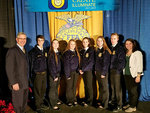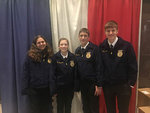 Narrowsburg
NarrowsburgLight Rain Fog/Mist, 43°
Wind: 8.1 mph
 Narrowsburg
NarrowsburgHONESDALE, PA — After a long absence from Honesdale, the National FFA Organization has recognized a new Wayne Highlands chapter to educate a budding generation of farmers and agriculturalists. …
Stay informed about your community and support local independent journalism.
Subscribe to The River Reporter today. click here
This item is available in full to subscribers.
Please log in to continue |


HONESDALE, PA — After a long absence from Honesdale, the National FFA Organization has recognized a new Wayne Highlands chapter to educate a budding generation of farmers and agriculturalists. “The FFA is a national organization, and it’s all about career success, leadership and personal growth,” says Kayla Hack, the district’s new ag teacher and advisor—and the first one since the 1970s, the last time agriculture was taught at Honesdale High School. “All of that is taking place through agriculture education,” says Hack.
And in Wayne County, as Hack notes, agriculture is huge. She says, “What’s really neat is right now, the face of agriculture—food and natural resources—is kind of changing in the county, and so you’re seeing a lot of stuff happen, you’re seeing a lot of strong traditions… but then a lot of new and beginning farmers as well…. “What I’ve heard [from the students and] the community is, ‘Finally, there’s an agriculture program again,’ or ‘thanks for bringing FFA back.’ The district made a big move when they decided to do that, but I think it’s an echo in the community that it was much needed.”
In agriculture education, Hack notes, there is what she calls the “leadership laboratory” component; the supervised agriculture experience, where students can participate outside the classroom, in an internship, a job, or a project; and the classroom portion. “Students are in class every single day, but because they’re in an agriculture class, they can also be an FFA member and gain those leadership skills.” Included in the agriculture curriculum is everything from forestry to food processing, animal science to horticulture and aquaculture. “Agriculture covers everything from the food we eat to the clothes we wear,” says Hack, “so we try to cover a little bit of everything in here as well.”
Official recognition from FFA has had its own impact. “There are over half a million FFA members in the country, so to have a program recognized in the state of Pennsylvania as a new FFA chapter— and receiving our federal charter from the Secretary of Education—that was a pretty big deal… In Pennsylvania, Honesdale was one of the first programs, but it went away for a while. And now that recharter, that renewing of our program— FFA program returns to Honesdale seeing that again is really cool, because we’re getting older members of the community saying, ‘I remember when I wore the blue jacket’—which is an iconic FFA jacket… blue corduroy, that my students have been able to receive”
The students think so, too. “I’m very into agriculture,” says Rachel Olver of Beach Lake. “I grew up on a farm, and I hunt, so that’s a big part of my life— and I’m in 4-H, which is another add-on, and another big part of it, because I love it, and I always want to be involved. So I’m just thankful that it’s back at Honesdale… I want to be a conservation officer, so I’m taking a Forestry class, and [they go] hand-in-hand with each other, so it helps me get more information about what I may need for the future.
“FFA is definitely going to be a big part of my future,” says Leah Neu of Preston. “I grew up in agriculture, my dad has his own logging business… and I’m a farmhand at one of our family farms, so I’ve definitely been around it… I’m looking forward to what new opportunities [it opens] for me…. I think I’m going to head towards the fishery, the fish commission direction... I’m definitely learning a lot [about] the maintenance of it. We did have a fish tank here, and that was an experience to deal with… It takes a lot of work to figure out the different pH balances... for the water temperature for the fish to survive in a tank like that.”
“This is a curriculum that is going to continue to grow, change and evolve,” says Hack. “But we’re doing some things inside right now, while it’s colder—for instance, in Forestry, we did all of our tree identification in the fall, the first two weeks of classes, before the leaves fell. But… in Food Processing, [we can] do butchering because we’re inside right now… Chainsaw safety is something that we’re doing, but if it’s too, too cold, or it’s snowed a lot, then we’re not outside. And so we go back and forth… just like anything in agriculture, the weather is part of that. But Horticulture I’m teaching in the spring, and so we’ll do a lot of our basic plant finds... when it’s cooler—but then, come this spring, we’ll do a lot of the landscaping, because we can be outside.”
Hack hopes to get the FFA even more involved in the outside community. “I would love to grow student projects in agriculture—so if a student is really interested in beekeeping, having them find a project or a producer to work with in the community, [so] they can learn more about that. Because you can only do so much in an eight-hour day, so how can I get these students outside the classroom, working in the community and learning about agriculture in that project-based, real-life way?” However, Hack is pleased with the progress the program has already made. “I’m excited to see where it goes. I don’t think it would have made the progress that it did if wasn’t for the fact that the students are excited, and that this community has come around to the program and has helped out in any way that they can. There [are] constantly guest speakers or helpers in here, and that’s what made it possible to grow it as quickly as we have.”
Comments
No comments on this item Please log in to comment by clicking here